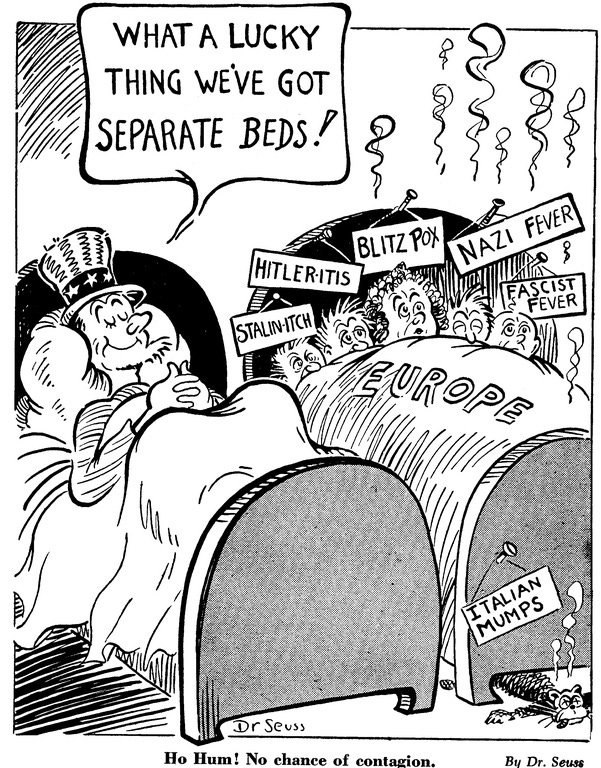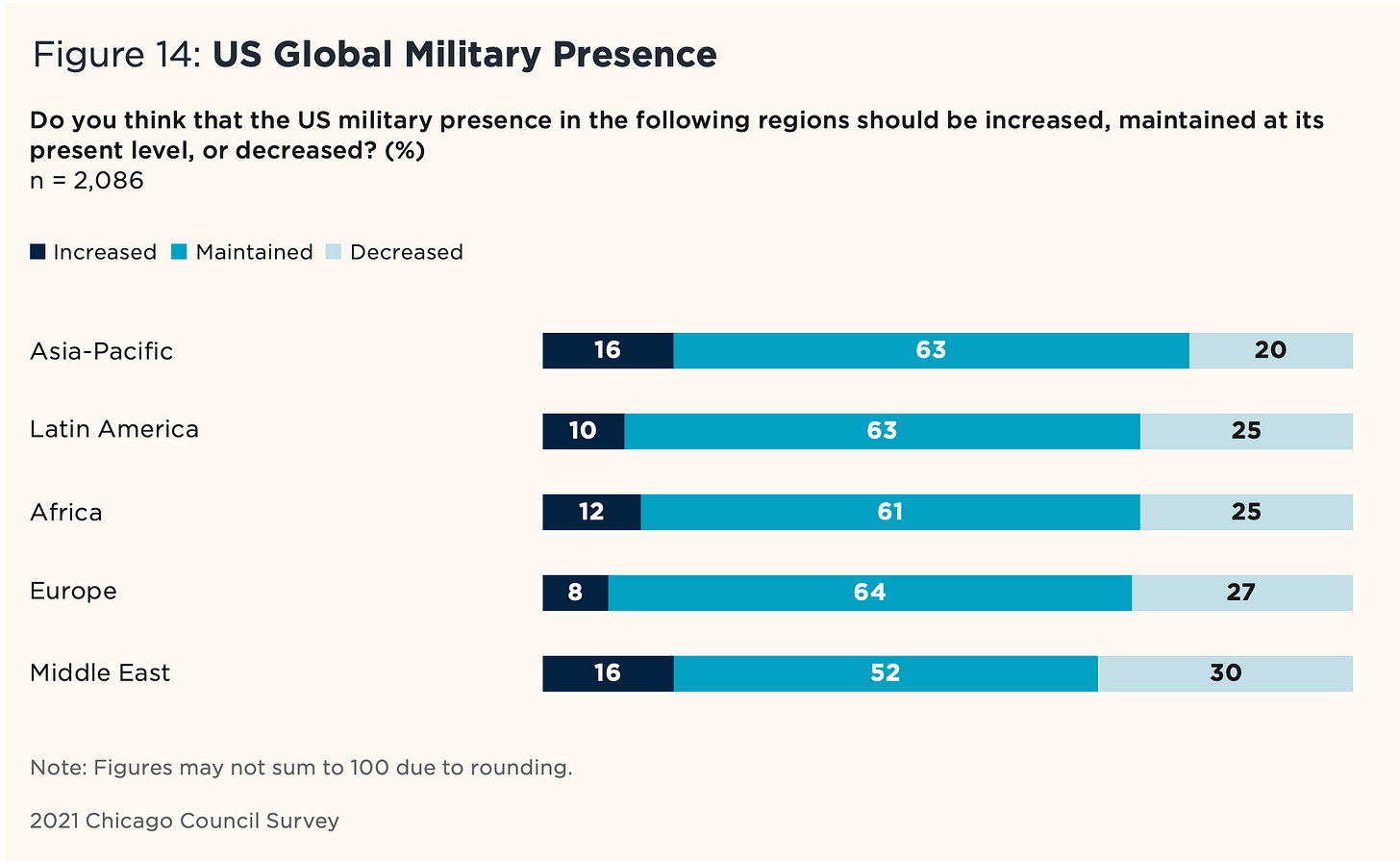First as Tragedy, Then as Farce: The Return of the Internationalist-Isolationist Divide
Why elite foreign policy debates of the future will resemble those of the distant past
Over the next decade, America’s foreign policy debate looks set to return to the contest between internationalism and isolationism that prevailed before World War II. That’s despite the otherwise strong and notably bipartisan support in Congress and among the American people for helping Ukraine defend itself against Russian aggression. Voices proclaiming themselves realists have very publicly worried about the possibility that Ukraine might beat back Moscow’s aggression and called on the Biden administration to hold Kyiv back while negotiating a settlement favorable to the Kremlin.
Never mind that these proposals misread the Putin regime’s goals, months after Putin and his cronies have made their war aims crystal clear in various public statements. These arguments and the generally respectful treatment they’ve received from most elite foreign policy quarters reflect the imminent return of the old division between internationalists and isolationists that roiled America’s foreign policy debates in the first half of the twentieth century. It’s important to remember that this divide doesn’t fall sharply along partisan or ideological lines; indeed, it’s not hard to find internationalists and isolationists among conservatives, moderates, and liberals and Democrats, Republicans, and independents.
Why has the debate between internationalists and isolationists reopened after nearly eighty years in abeyance? In part, the Cold War suppressed instincts toward isolationism on the far right – instincts that never truly went away and later bubbled up in the form of President Donald Trump. On the left, factions sympathetic to the Soviet Union were anathema to mainstream liberals until the Vietnam War; after, New Left isolationists made up an important but not terribly influential part of the Democratic Party’s coalition. The end of the Cold War did not lead to a resurgence of isolationism in the 1990s, nor did the wars in Afghanistan and Iraq – at least initially.
It took until the mid-2010s for isolationism to reemerge on both left and right. President Obama had campaigned in part on his opposition to the Iraq war, and though very much willing to use force he only did so with extreme reluctance – to the point he congratulated himself for failing to respond against the Assad regime in Syria when it massacred thousands of Syrians with sarin nerve agent. Similarly, an exhausted and demoralized foreign policy establishment could see little in the way of positives from a decade and a half of intense exertion in the Middle East. When Donald Trump seized the Republican nomination for president in 2016, he vowed to pursue a belligerent, isolationist foreign policy under the slogan “America First.”
Trump’s foreign policy team (such as it was) managed to avert a lurch into full-blown isolationism – including potential U.S. withdrawal from NATO and America’s alliance with South Korea – during his term in office. But Trump did leave his mark on the foreign policy views of the Republican Party, tacitly cultivating a strong nationalist-isolationist constituency within the party itself along with his own cult of personality. Trump largely effected this change by serving as head of the party since 2015 and 2016, but he’s since received more active and witting support from the likes of Fox News and especially prime-time host Tucker Carlson. That helps explain why almost a third of the House Republican caucus voted against a symbolic resolution in support of NATO and how eleven Senate Republicans voted against the recent $40 billion military aid package for Ukraine.
For their part, Democrats have a vocal but much smaller isolationist caucus. While there’s no Trump-like figure to serve as a focal point for those on the left with isolationist leanings, the foreign policy left has exercised an influence over the Democrats on certain issues well beyond their currently small numbers. Take Saudi Arabia: it’s due in no small part to pressure from the left that candidate Biden declared Riyadh a pariah state during the Democratic primaries, a stance that helped sour relations just as energy prices began to rise. However, this victory has become somewhat pyrrhic for the isolationist left as the Biden administration plans a fence-mending trip to the Middle East this summer that will include a stopover in Saudi Arabia.
Still, it’s likely this faction will see its influence grow ahead of the likely Democratic bloodbath this November. A number of more moderate and internationalist members of Congress like Reps. Elissa Slotkin (D-MI), Tom Malinowski, (D-NJ), and Abigail Spanberger (D-VA) could very well lose their seats to Republican challengers. That will leave Democrats with a smaller but more left-wing caucus, one more dominated by isolationist voices and deprived of more mainstream internationalist ones. In other words, these voices will have a bigger piece of a much smaller political pie.
Finally, our morally exhausted and increasingly pessimistic foreign policy elites have played a critical role in reviving the old debate between internationalism and isolationism. The undercurrent of fatalism that pervades much discussion of America’s foreign policy was best expressed by former Obama White House official (now national security adviser to Vice President Harris) Phil Gordon in 2015:
In Iraq, the U.S. intervened and occupied, and the result was a costly disaster. In Libya, the U.S. intervened and did not occupy, and the result was a costly disaster. In Syria, the U.S. neither intervened nor occupied, and the result is a costly disaster.
It’s a mindset that tells America that it’s doomed to failure no matter what it does in foreign policy, with an implicit but clear message that perhaps it’s just best if we don’t even bother any more. Like their predecessors who were burned by intervention in World War I, today’s foreign policy elites have been burned by the Iraq war and two decades of seemingly futile conflict in the Middle East – as well as the shock and trauma of the Trump presidency. That frame of mind may not lead to an outright endorsement of isolationism, but it’s not difficult to see why so many of America’s foreign policy elites grant their supposed rivals in the “restraint” camp as much respect and credibility as they do.
Right now, though, it’s too early to say precisely where this new isolationist-internationalist debate will ultimately end up. Despite prominent perches in high-profile media outlets and well-funded think tank sinecures, the restraint camp and its underlying worldview lack support from majorities Americans. Nor have world events been kind to isolationism: most Americans support the Biden administration’s approach to the war in Ukraine in substance, and they remain worried about China’s power and influence in the world.
Still, domestic politics has given isolationism influence among elites disproportionate to its actual popular support. Thanks to Trump’s hold over the Republican Party and prominent media voices, there’s now a significant isolationist faction among conservatives that party leaders must contend with. Matters are somewhat better among Democrats, but their own isolationist caucus will probably only grow louder after this year’s mid-term elections. Foreign policy elites appear willing to give isolationist voices on both right and left much more than their due.
This debate will likely generate more heat than light, and it will tell us very little about where America’s foreign policy should go moving forward. It’s a debate that’s all the more dangerous given the way the world has changed from the last time internationalists and isolationists went at it: technology has brought the world much closer together and given it the means to destroy itself. What’s more, the United States now plays an integral role in the security of both Europe (as we’ve seen in Ukraine) and the Pacific; to pull America out of these regions would be to invite geopolitical chaos that’s manifestly not in America’s own interests.
These foreign policy questions and problems won’t vanish because the United States chooses not to pay attention to them. Our elite foreign policy debates may well become increasingly unmoored from reality as result – almost as unmoored from reality as our domestic political debates.







